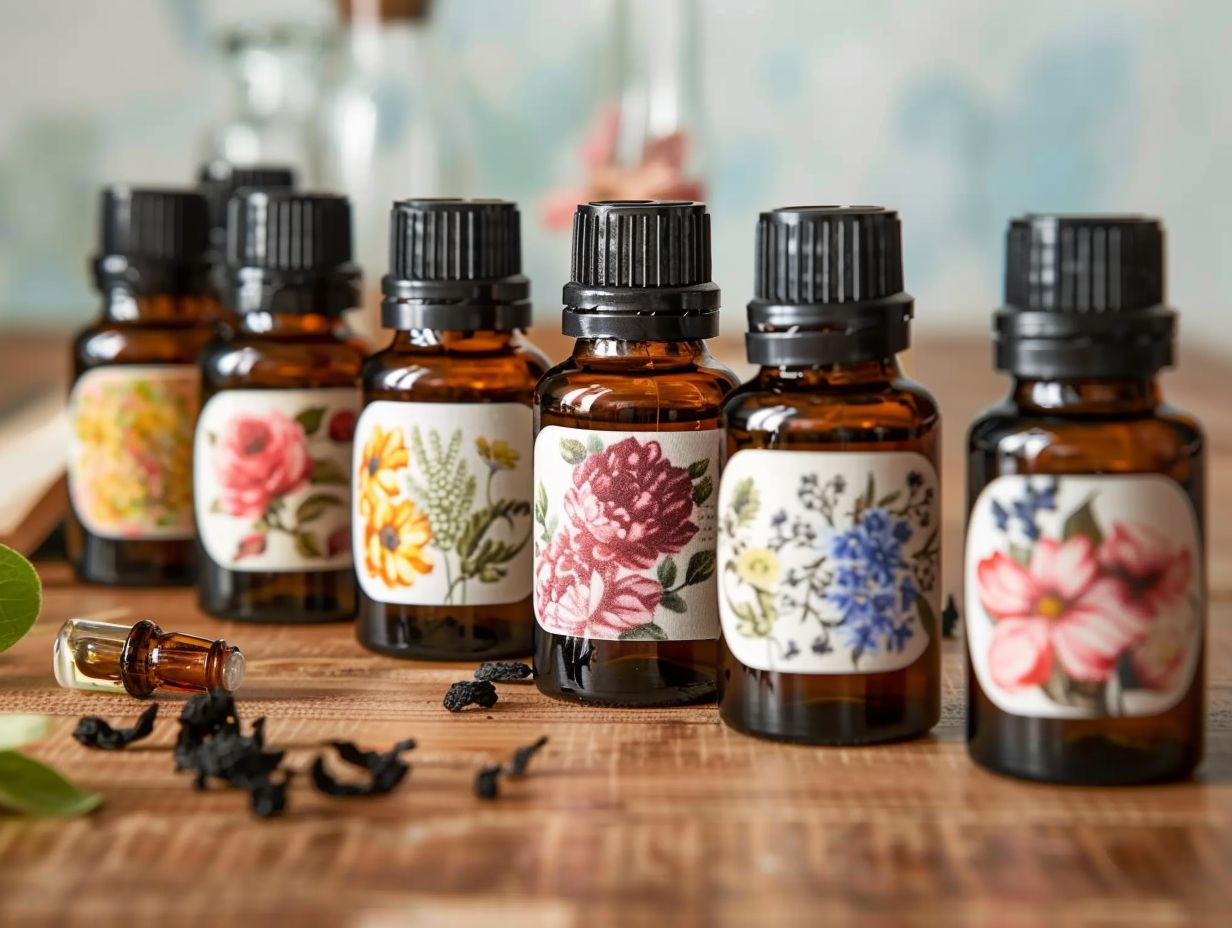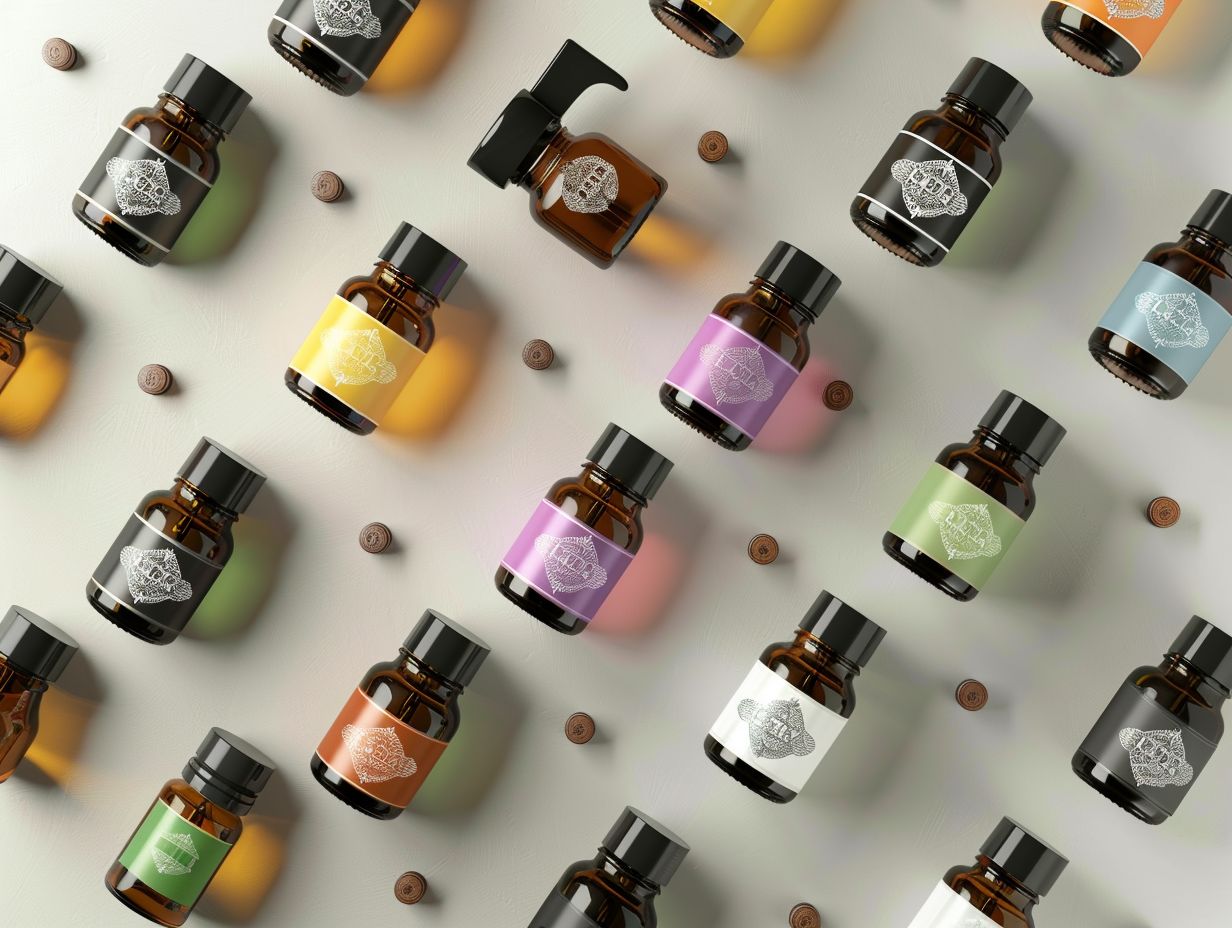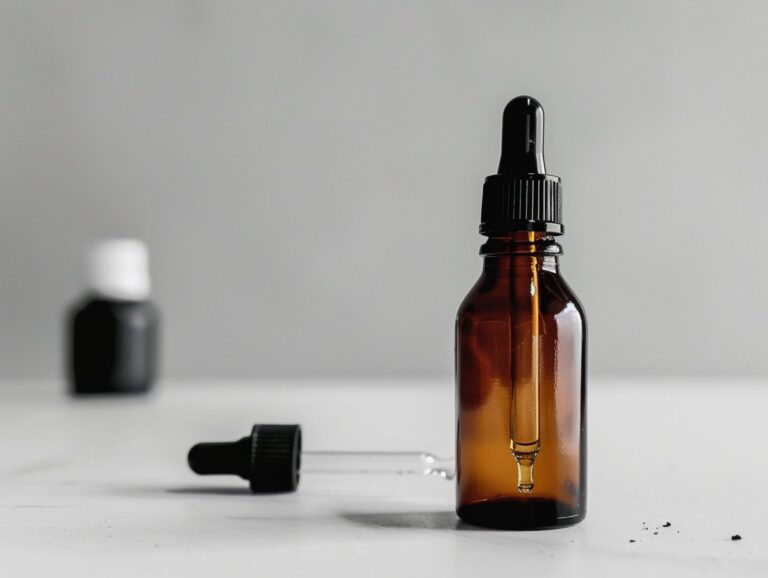Which Essential Oils Have Linalool
Curious about linalool and essential oils?
We explore the world of essential oils, including the different types and their benefits.
Discover how essential oils work and the various ways you can use them, focusing on essential oils containing linalool like lavender, basil, and lemon.
Learn about the possible side effects of using essential oils with linalool and get tips on how to use them safely. Let’s dive in!
Key Takeaways:
What Is Linalool?
Linalool is a naturally occurring compound found in various plants and essential oils, known for its aromatic properties and therapeutic effects. It belongs to the group of compounds known as monoterpenes and is recognized for its calming and soothing properties.
Its distinct floral scent is often associated with lavender essential oil, where it is abundantly present. The molecular structure of linalool consists of a cyclic structure combined with a side chain, contributing to its unique fragrance. In aromatherapy, linalool is valued for its ability to promote relaxation and reduce stress levels, making it a popular choice in diffusers and massage oils. The Amazon rainforest is a significant source of linalool-rich plants, highlighting its diverse ecological importance in natural habitats. Linalool’s antimicrobial properties have been studied for their potential in plant-based therapies, suggesting a broader application beyond just its aromatic appeal.
What Are Essential Oils?
Essential oils are concentrated hydrophobic liquids derived from plants that contain the natural aroma and properties of the plant they are extracted from. These oils are known for their therapeutic effects and have been used for centuries in various traditional medicine practices.
The extraction process of essential oils involves methods like steam distillation, solvent extraction, or cold pressing, where the volatile compounds of the plant are captured and concentrated into the oil. These compounds, such as terpenes, phenolics, and esters, are responsible for the diverse range of benefits that essential oils offer.
When inhaled or applied topically, essential oils can promote relaxation, reduce stress, boost immunity, and alleviate various ailments like headaches, digestive issues, and skin conditions. Aromatherapy, the practice of using these oils for therapeutic purposes, is gaining popularity in healthcare settings and among individuals seeking natural remedies.
What Are the Different Types of Essential Oils?
There is a wide range of essential oils available, each derived from different plants and possessing unique aromatic and therapeutic properties. Some popular types include lavender essential oil, basil essential oil, and citrus bergamia essential oil.
These essential oils are commonly used in aromatherapy, a holistic practice that harnesses the power of aromatic plants to promote physical and mental well-being.
Coriander essential oil, for instance, is known for its anti-inflammatory and antimicrobial effects due to its high levels of linalool and geranyl acetate. When inhaled or applied topically, it can help ease pain and reduce inflammation. Many essential oils, including coriander, interact with the central nervous system (CNS) to induce relaxation and improve mood.
What Are the Benefits of Essential Oils?
Essential oils offer a wide array of health benefits due to their natural compounds and therapeutic effects.
These volatile oils extracted from plants have been utilized for centuries in traditional medicine and aromatherapy. The intricate combination of bioactive molecules found in essential oils interacts synergistically with the body, promoting various physiological responses. For instance, the antioxidants present in certain oils can combat oxidative stress, a key factor in aging and disease development.
Some essential oils have been linked to the modulation of Brain-Derived Neurotrophic Factor (BDNF), a protein crucial for brain health and cognitive function. This interaction shows promise in conditions like anxiety and depression by promoting neurogenesis and synaptic plasticity.
How Do Essential Oils Work?
Essential oils exert their effects through various mechanisms in the body, interacting with the CNS and neuroendocrine system to produce therapeutic effects. These oils modulate pathways involved in the inflammatory process and oxidative stress, contributing to their overall health-promoting properties.
When essential oils are inhaled, the volatile compounds travel through the olfactory system, directly impacting the limbic system of the brain responsible for emotions and memory. This interaction can lead to mood enhancement, stress reduction, and improved cognitive function. Some essential oils exhibit analgesic properties by influencing pain perception pathways. In addition, certain compounds in essential oils have been shown to interact with ion channels and neurotransmitter receptors, affecting neuronal signaling and synaptic transmission.
What Are the Different Ways to Use Essential Oils?
Essential oils can be used in various ways, with aromatherapy being one of the most common methods of application. They serve as a therapeutic tool in promoting relaxation, mood enhancement, and overall well-being through inhalation or topical use.
Whether utilized in massage therapy to alleviate muscle tension and promote circulation, or diffused in the air to create a calming ambiance, essential oils have profound effects on the mind and body. Ylang Ylang, known for its floral and slightly fruity scent, is often used to reduce stress and anxiety. These oils are extracted from natural sources such as flowers, leaves, stems, or roots, making them a pure and potent medicinal tool to support various health and wellness goals.
Which Essential Oils Contain Linalool?

Basile essential oil, known for its fresh and herbaceous aroma, contains linalool which enhances its therapeutic benefits. Coriander essential oil, characterized by its warm and spicy scent, is another source rich in linalool, offering a sense of relaxation and stress relief.
Bergamot essential oil, renowned for its citrusy fragrance, also contains linalool, providing mood-lifting and anxiety-reducing properties. These oils, with their diverse scents and linalool concentrations, offer a range of benefits for both physical and emotional well-being.
Lavender Essential Oil
Lavender essential oil is renowned for its calming and soothing properties, making it a popular choice in aromatherapy for relaxation and stress relief. Its sedative effects are well-documented in scientific literature, highlighting its effectiveness in promoting restful sleep and reducing anxiety.
Research conducted by a leading science group revealed that inhaling lavender essential oil can reduce levels of the stress hormone cortisol, resulting in a sense of peace and relaxation. The therapeutic effects of lavender oil extend to reducing symptoms of insomnia and improving overall sleep quality. By diffusing the oil or applying it topically, individuals can experience the benefits of this natural remedy for stress management and sleep disorders.
Basil Essential Oil
Basil essential oil possesses strong antibacterial and antimicrobial properties, making it a valuable natural remedy for various skin conditions and infections. Its aromatic profile and therapeutic benefits have been extensively studied in scientific research, showcasing its potential as a potent healing agent.
This essential oil is rich in compounds such as eugenol, linalool, and methyl chavicol, which contribute to its remarkable antibacterial effects.
When applied topically, basil essential oil can help combat acne-causing bacteria, reduce inflammation, and promote skin regeneration.
Its antimicrobial properties make it effective in preventing and treating minor cuts, scrapes, and wounds.
These therapeutic effects extend beyond skincare, as basil essential oil is also used in aromatherapy to alleviate stress and anxiety.
Clary Sage Essential Oil
Clary Sage essential oil is recognized for its antidepressant and mood-enhancing properties, offering a natural alternative for individuals managing symptoms of depression and anxiety. Its aromatic profile and synergistic mechanisms make it a valuable therapeutic tool in promoting emotional well-being.
Research studies have indicated that the properties of Clary Sage essential oil extend beyond just its pleasant scent. Studies have shown that inhaling the aroma of Clary Sage oil can help reduce cortisol levels, the hormone associated with stress. The oil is believed to interact with brain chemicals like serotonin and dopamine, which play crucial roles in mood regulation. Its calming effects on the nervous system inspire a sense of tranquility and relaxation, making it a beneficial component in aromatherapy practices aimed at alleviating symptoms of psychological distress.
Coriander Essential Oil
Coriander essential oil is derived from the seeds of the Coriandrum sativum plant and offers a range of therapeutic benefits, including its use in behavioral models to study its effects on mood and cognition. Its aromatic properties and natural compounds play a crucial role in its efficacy as a medicinal tool.
The main bioactive compound found in coriander essential oil is linalool, which is known for its calming and stress-reducing effects. When rodents were exposed to inhalation of coriander essential oil containing linalool, there was a noticeable decrease in anxiety-like behavior and an improvement in memory tasks. These results have sparked further interest in exploring the potential of coriander essential oil as a natural remedy for stress-related disorders. The antioxidant properties of coriander essential oil, notably due to the presence of -pinene and terpinene compounds, contribute to its neuroprotective effects against oxidative stress.”
Bergamot Essential Oil
Bergamot essential oil is renowned for its therapeutic effects on the cardiovascular system, where it helps promote heart health and circulation. Its aromatic profile and bioactive molecules contribute to its benefits in maintaining cardiovascular well-being.
Health benefits of Bergamot essential oil extend beyond just its pleasant scent. Studies have shown that it can help lower cholesterol levels and reduce blood pressure, both crucial factors in preventing cardiovascular diseases. The key molecules found in Bergamot oil, such as limonene and linalool, have antioxidant and anti-inflammatory properties that support overall heart health. These compounds work synergistically to improve blood flow, strengthen blood vessels, and reduce the risk of blood clots, all of which are vital for a healthy cardiovascular system.
Lemon Essential Oil
Lemon essential oil is known for its calming and soothing properties, making it a popular choice in aromatherapy for relaxation and mood enhancement. Its fresh citrus aroma and therapeutic benefits contribute to its positive effects on mental well-being.
The scent of lemon essential oil has been shown to reduce feelings of stress and anxiety by promoting the production of serotonin, a neurotransmitter known for its mood-regulating properties. Incorporating this essential oil into your daily routine can help create a peaceful atmosphere and enhance emotional balance.
Studies have also suggested that lemon essential oil may have interacting benefits when used in combination with other essential oils, such as lavender or chamomile, for a synergistic effect in promoting relaxation and reducing tension.
Spearmint Essential Oil

Spearmint essential oil possesses antioxidant and anti-inflammatory properties, which contribute to its role in promoting overall health and well-being. Its aromatic profile and therapeutic effects make it a valuable addition to skincare and aromatherapy practices.
Studies have shown that spearmint essential oil contains compounds like carvone and limonene, which exhibit powerful antioxidant effects, helping to combat oxidative stress in the body. These antioxidants play a crucial role in protecting cells from damage caused by free radicals, thereby reducing the signs of aging and promoting skin health.
Plus its antioxidant properties, the anti-inflammatory nature of spearmint essential oil makes it beneficial for calming and soothing inflamed skin conditions such as acne, eczema, and psoriasis. By reducing inflammation, it helps in achieving a clearer and more balanced complexion.
Rosewood Essential Oil
Rosewood essential oil is known for its sedative properties, helping promote relaxation and stress relief. Its therapeutic effects on mental well-being and emotional balance have made it a popular choice in aromatherapy and relaxation practices.
One of the key components responsible for rosewood essential oil’s calming effects is linalool, a compound also found in lavender and bergamot, known for its soothing properties. When inhaled, the oil’s aroma stimulates the limbic system in the brain, which regulates emotions and memories, promoting a sense of calm and serenity.
This essential oil is often used in blends or diffused in the air to create a peaceful atmosphere, perfect for unwinding after a long day or during meditation sessions. Its gentle floral scent is not only pleasant but also aids in reducing feelings of anxiety and tension.
Jasmine Essential Oil
Jasmine essential oil is valued for its calming and antibacterial properties, offering a natural solution for relaxation and skincare. Its floral aroma and health benefits make it a popular choice in holistic wellness and beauty regimens.
Derived from the flowers of the aromatic jasmine plant, this essential oil is known for its ability to soothe the mind and body. When used in skincare, it can help reduce inflammation, redness, and blemishes due to its antimicrobial properties. Beyond its skincare benefits, the inhalation of jasmine essential oil can uplift mood and reduce anxiety, making it a valuable tool for stress relief and emotional well-being.
Ylang Ylang Essential Oil
Ylang Ylang essential oil is recognized for its antidepressant effects on the neuroendocrine system, offering emotional support and mood enhancement. Its floral fragrance and synergistic mechanisms contribute to its positive impact on mental well-being.
Research suggests that the aroma of Ylang Ylang can stimulate the brain to release BDNF, a crucial protein that promotes the growth of new neurons and strengthens existing connections, essential for mood regulation and emotional balance.
The oil’s ability to reduce cortisol levels, the body’s stress hormone, plays a significant role in alleviating anxiety and promoting relaxation.
The unique chemical compounds found in Ylang Ylang interact with neurotransmitter receptors in the brain, such as serotonin, helping to enhance feelings of happiness and well-being.
What Are the Possible Side Effects of Using Essential Oils with Linalool?
While essential oils containing linalool offer numerous benefits, there are potential side effects to consider, especially concerning interactions with medications and individual sensitivities. It is advisable to consult a healthcare provider before using these oils, particularly if you have underlying health conditions or are pregnant.
Some medications may not interact well with linalool, potentially leading to adverse effects or reduced efficacy. Consulting a healthcare provider is essential to ensure the safe use of essential oils, as they can impact the effectiveness of certain drugs. The Food and Drug Administration (FDA) does not regulate essential oils, so it is crucial to seek professional advice to avoid any complications. Being aware of possible changes in medication effectiveness or side effects is paramount when incorporating essential oils into your wellness routine.
How to Use Essential Oils Safely with Linalool?
To ensure the safe and effective use of essential oils containing linalool, it is essential to follow proper guidelines and precautions. Incorporating these oils into your daily routine, along with a balanced diet and regular exercise, can enhance their therapeutic benefits and promote overall well-being.
Proper dilution methods are crucial when using essential oils with linalool to prevent skin irritation or sensitization. One common dilution ratio is 2-3% essential oil to carrier oil, but it’s advisable to perform a patch test before widespread use.
Application techniques vary depending on the desired effect. For topical application, gentle massage or diffusion in the air can be effective. Inhalation methods like steam inhalation or using a diffuser can offer respiratory benefits.
Plus using essential oils, maintaining a healthy lifestyle through a nutritious diet and regular physical activity can boost the overall effectiveness of these oils. Hydration is also key to aid in the body’s natural detoxification process.
Conclusion
In conclusion, essential oils containing linalool offer a natural and holistic approach to wellness, providing a wide range of health benefits through aromatherapy and therapeutic applications. Their interactions with the body’s systems and pathways make them valuable tools in promoting physical and mental well-being.
These oils, derived from plants found across the Earth, contain linalool as a predominant natural compound known for its calming and stress-relieving properties. When inhaled or applied topically, linalool-rich oils can positively impact mood, reduce anxiety, and improve sleep quality. The antimicrobial and anti-inflammatory effects of essential oils contribute to their efficacy in treating various health conditions.
Aromatherapists and healthcare practitioners often incorporate linalool-containing oils into their practices to support respiratory health, alleviate headaches, and enhance relaxation. The versatility of these essential oils allows for personalized blends tailored to individual needs and preferences.
Frequently Asked Questions
Which Essential Oils Have Linalool?
Linalool is a common component found in many essential oils. Below are some frequently asked questions about which essential oils contain linalool.
What is linalool?
Linalool is a naturally occurring terpene alcohol that is found in many plants, including various essential oils. It has a pleasant floral scent and is often used in perfumes and aromatherapy.
Which essential oils have the highest concentration of linalool?
Linalool can be found in many essential oils, but some of the highest concentrations are found in lavender, bergamot, and coriander essential oils.
Are there any potential benefits of using essential oils with linalool?
Linalool has been shown to have anti-inflammatory and sedative properties. It may also have a calming effect and can be used for relaxation and stress relief.
Can linalool cause any adverse reactions?
While linalool is generally considered safe, it can potentially cause skin irritation or allergic reactions in some individuals. It is always recommended to do a patch test before using any essential oil topically.
Do all essential oils contain linalool?
No, not all essential oils contain linalool. It is only found in certain plants and is not a common component in all essential oils.
Can linalool be used in cooking or ingested?
No, linalool should not be ingested as it can be toxic. It is safe to use in aromatherapy or topically, but should not be consumed.









One Comment